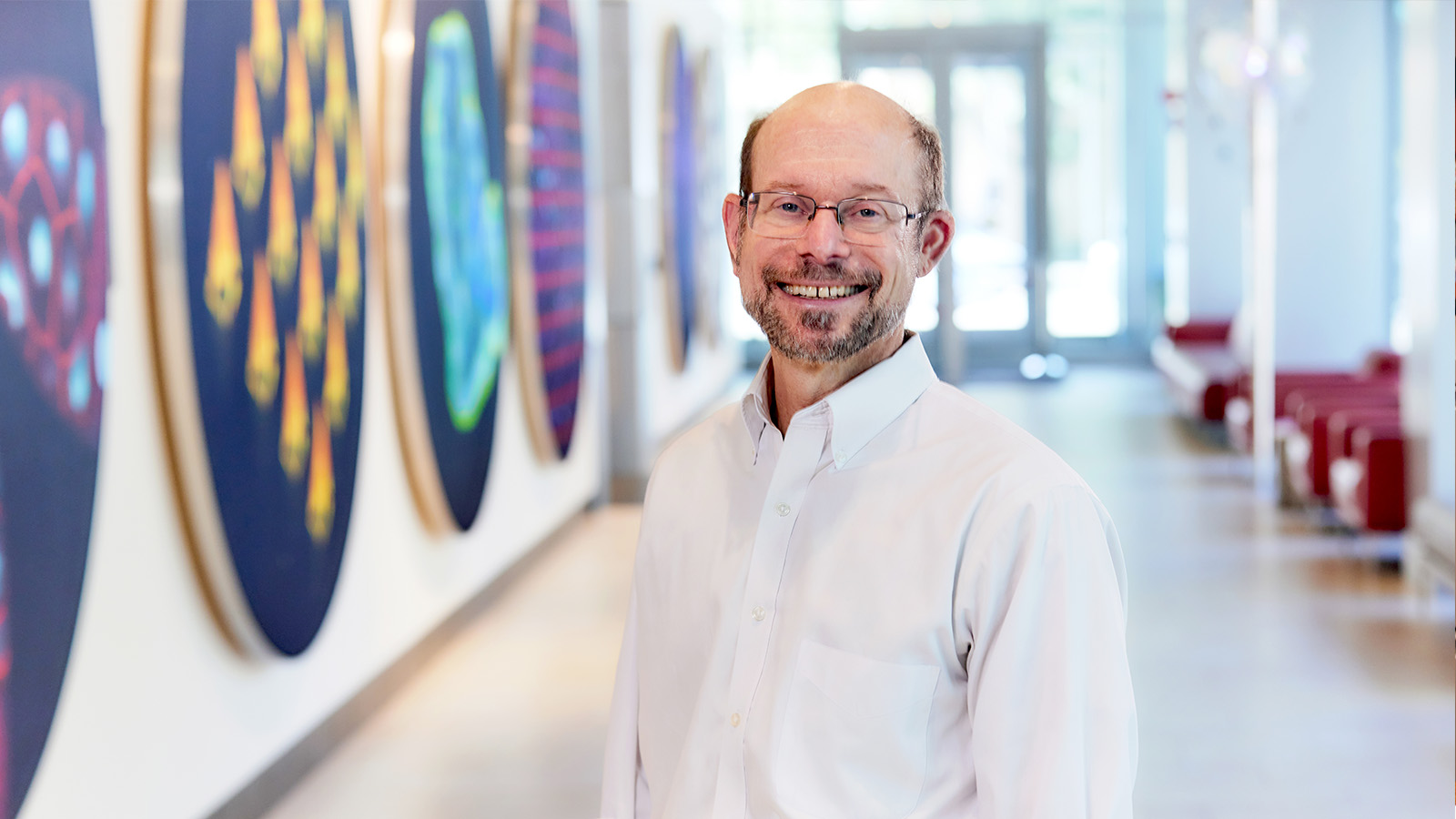Education
- PhD, 1987, Case Western Reserve University; MD, 1989, Case Western Reserve University
- BS, 1981, Chemistry with Concentration in Solid-State and Polymer Physics, Cornell University
Research Summary
Our goal is to understand how signaling pathways are integrated at the molecular and systems levels to control cellular responses. We have two main focuses: First, we study signaling pathways and networks that control cell cycle progression and DNA damage responses in cancer and cancer therapy. Second, we examine the cross-talk between inflammation, cytokine signaling and cancer. Much of our work focuses on how modular protein domains and kinases work together to build molecular signaling circuits, and how this information can be used to design synergistic drug combinations for the personalized treatment of human disease.Awards
- MacVicar Faculty Fellow, 2021
- Fellow, Association of American Physicians, 2021
- Teaching with Digital Technology Award, 2018
Key Publications
- A Pleiotropic RNA-Binding Protein Controls Distinct Cell Cycle Checkpoints to Drive Resistance of p53-Defective Tumors to Chemotherapy. Cannell, IG, Merrick, KA, Morandell, S, Zhu, CQ, Braun, CJ, Grant, RA, Cameron, ER, Tsao, MS, Hemann, MT, Yaffe, MB et al.. 2015. Cancer Cell 28, 623-637.
doi: 10.1016/j.ccell.2015.09.009PMID:26602816 - Phospho-Ser/Thr-binding domains: navigating the cell cycle and DNA damage response. Reinhardt, HC, Yaffe, MB. 2013. Nat Rev Mol Cell Biol 14, 563-80.
doi: 10.1038/nrm3640PMID:23969844 - The bromodomain protein Brd4 insulates chromatin from DNA damage signalling. Floyd, SR, Pacold, ME, Huang, Q, Clarke, SM, Lam, FC, Cannell, IG, Bryson, BD, Rameseder, J, Lee, MJ, Blake, EJ et al.. 2013. Nature 498, 246-50.
doi: 10.1038/nature12147PMID:23728299 - Sequential application of anticancer drugs enhances cell death by rewiring apoptotic signaling networks. Lee, MJ, Ye, AS, Gardino, AK, Heijink, AM, Sorger, PK, MacBeath, G, Yaffe, MB. 2012. Cell 149, 780-94.
doi: 10.1016/j.cell.2012.03.031PMID:22579283 - DNA damage activates a spatially distinct late cytoplasmic cell-cycle checkpoint network controlled by MK2-mediated RNA stabilization. Reinhardt, HC, Hasskamp, P, Schmedding, I, Morandell, S, van Vugt, MA, Wang, X, Linding, R, Ong, SE, Weaver, D, Carr, SA et al.. 2010. Mol Cell 40, 34-49.
doi: 10.1016/j.molcel.2010.09.018PMID:20932473
Recent Publications
- An RNA damage response network mediates the lethality of 5-FU in colorectal cancer. Chen, JK, Merrick, KA, Kong, YW, Izrael-Tomasevic, A, Eng, G, Handly, ED, Patterson, JC, Cannell, IG, Suarez-Lopez, L, Hosios, AM et al.. 2024. Cell Rep Med 5, 101778.
doi: 10.1016/j.xcrm.2024.101778PMID:39378883 - Neutrophil-mediated Inflammatory Plasminogen Degradation, Rather Than High Plasminogen-Activator Inhibitor-1, May Underly Failures and Inefficiencies of Intrapleural Fibrinolysis. Barrett, CD, Moore, PK, Moore, EE, Moore, HB, Chandler, JG, Siddiqui, H, Maginot, ER, Sauaia, A, Pérez-Calatayud, AA, Buesing, K et al.. 2024. Chest , .
doi: 10.1016/j.chest.2024.04.005PMID:38710463 - Biphasic JNK-Erk signaling separates the induction and maintenance of cell senescence after DNA damage induced by topoisomerase II inhibition. Netterfield, TS, Ostheimer, GJ, Tentner, AR, Joughin, BA, Dakoyannis, AM, Sharma, CD, Sorger, PK, Janes, KA, Lauffenburger, DA, Yaffe, MB et al.. 2023. Cell Syst 14, 582-604.e10.
doi: 10.1016/j.cels.2023.06.005PMID:37473730 - The mission to ensure continued funding for excellent basic research. Lamond, AI, Dikic, I, Nussenzweig, A, Müller, CW, Thornton, JM, Yaffe, MB. 2023. EMBO Rep 24, e57498.
doi: 10.15252/embr.202357498PMID:37227159 - An RNA Damage Response Network Mediates the Lethality of 5-FU in Clinically Relevant Tumor Types. Chen, JK, Merrick, KA, Kong, YW, Izrael-Tomasevic, A, Eng, G, Handly, ED, Patterson, JC, Cannell, IG, Suarez-Lopez, L, Hosios, AM et al.. 2023. bioRxiv , .
doi: 10.1101/2023.04.28.538590PMID:37162991 - MAPKAP Kinase-2 phosphorylation of PABPC1 controls its interaction with 14-3-3 proteins after DNA damage: A combined kinase and protein array approach. Stehn, JR, Floyd, SR, Wilker, EW, Reinhardt, HC, Clarke, SM, Huang, Q, Polakiewicz, RD, Sonenberg, N, Kong, YW, Yaffe, MB et al.. 2023. Front Mol Biosci 10, 1148933.
doi: 10.3389/fmolb.2023.1148933PMID:37091863 - Neutrophil heterogeneity and emergence of a distinct population of CD11b/CD18-activated low-density neutrophils after trauma. Goretti Riça, I, Joughin, BA, Teke, ME, Emmons, TR, Griffith, AM, Cahill, LA, Banner-Goodspeed, VM, Robson, SC, Hernandez, JM, Segal, BH et al.. 2023. J Trauma Acute Care Surg 94, 187-196.
doi: 10.1097/TA.0000000000003823PMID:36694330 - Seeing is great, understanding is better. Thorp, HH, Yaffe, MB. 2023. Sci Signal 16, eadg2868.
doi: 10.1126/scisignal.adg2868PMID:36626579 - Plk1 Inhibitors and Abiraterone Synergistically Disrupt Mitosis and Kill Cancer Cells of Disparate Origin Independently of Androgen Receptor Signaling. Patterson, JC, Varkaris, A, Croucher, PJP, Ridinger, M, Dalrymple, S, Nouri, M, Xie, F, Varmeh, S, Jonas, O, Whitman, MA et al.. 2023. Cancer Res 83, 219-238.
doi: 10.1158/0008-5472.CAN-22-1533PMID:36413141 - Multi-pathway DNA-repair reporters reveal competition between end-joining, single-strand annealing and homologous recombination at Cas9-induced DNA double-strand breaks. van de Kooij, B, Kruswick, A, van Attikum, H, Yaffe, MB. 2022. Nat Commun 13, 5295.
doi: 10.1038/s41467-022-32743-wPMID:36075911

